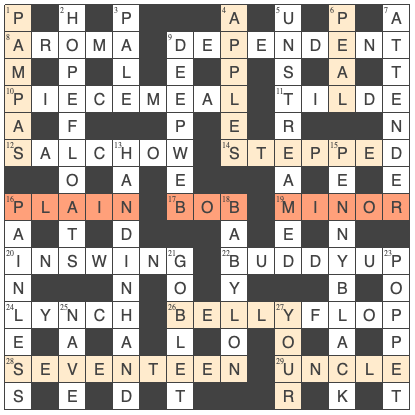Filbert tests the old grey matter today…..
…and quite a test it was!
Tuesday is theme day and Filbert has given us a multiplicity of interconnected entries, focused on PLAIN BOB MINOR, the entries at 16, 17 and 19ac. The three words together relate to Bell-ringing, with connections to 26ac and 6d. PLAIN relates to 1d, part of 14ac and is part of the wordplay for 16d. BOB relates to 4d and features in the wordplay for 2d (3 times!), 15d and 27d/29ac. MINOR relates to 28ac and features in the wordplay for 16d.
Quite a tangled web to unravel, with several fairly obscure definitions and crafty misdirections – as we have come to expect from this setter. Quite a few answers ended up being parsed after we had solved the clue from the definition and crossing letters
Thanks to Filbert for the mind-bending!

ROMA (traveller) after A (last letter or ‘back’ of India)
D E (first letters or ‘starts’ of Do Elegant) PEN (female swan) DENT (impression)
PIE (pastry) + an anagram (‘demolished’) of LEE MACk missing the last letter or ‘shortly’
TILE (flat ceramic) round or ‘including’ D (date)
OW (‘that hurts’) after an anagram (‘jarring’) of CLASH – we had to check the spelling of this!
STEPPE (plain – 16ac) + D
PLAn (design) missing the last letter or ‘unfinished’ + IN (home)
When the job’s done, a typical phrase is: ‘BOB’ s your (27d) uncle (29ac)’ – the definition is a reference to Bob the Builder, the children’s animated cartoon character
IN (‘pally’ – friendly with) O (old) in or ‘banked by’ MR
INSect (‘e.g. fly’) missing the last three letters or ‘cut in half’ + WING (what keeps a fly in the air)
BUDD (Zola Budd – South African athlete renowned for running barefoot) YUP (‘yes’ – agreed)
LuNCH (meal) with the ‘u’ (one ‘side’ of ‘you’) replaced by Y (the other side of ‘you’)
A plain (16ac) bob (17ac) minor (19ac) is a term in BELL-ringing (rung on six bells) – so a disastrous attempt at this might fancifully be described as a BELL-Y FLOP
When someone is aged SEVENTEEN, they are ‘still just’ a minor (19ac) – the age of majority being 18
N (name) in an anagram (‘cryptic’) of CLUE
PA’S (old man’s) after or ‘holding up’ (in a down clue) a reversal (‘the wrong way round’) of MAP – PAMPAS being a South American plain (16ac)
HOPE (Bob -17ac – Hope – ‘a famous Hope’) FLOAT (bob – 17ac) S (shilling – ‘bob’ – 17ac) – we had to check the film as we have not come across it before
PA (personal assistant – ‘secretary’) LEft (missing ‘the FT’)
APPLiES (is relevant) missing or ‘bar’ the ‘i’ (one) – a reference to apple-bobbing (17ac)
An anagram (‘new’) of DUSTMEN ARE
Filbert is asking us to swap the last pair of letters in PALE (3d) to make PAEL, then swap the middle pair to make PEAL – as in bell-ringing changes
AT (in response to) TENDER (offer)
An anagram (‘crazy’) of WE’D BE round or ‘keeping’ EP (record) – a new phrase for us – we were convinced it should be ‘dark web’, but Chambers has it as an alternative description of the part of the web not indexed by search engines
If you were to take a ‘hand’ or bunch of bananas to lost property you would HAND IN a HAND
A PENNY BLACK was one of the first postage stamps issued in the UK – it comprised a portrait of Queen Victoria – at a cost of one old penny each, you would get 12 for a shilling or ‘bob’ (17ac)
PlAIN (16ac) missing or ‘taking away’ the ‘l’ (50 in Roman numerals) + LESS (minor – 19ac)
BABY (honey – a term of endearment – mainly in America) L (left) ON (over)
GO (try) B (British) L (league) ET (‘and’ in French)
POP (quickly deflate) PET (favourite)
Hidden in LexingtoN AVEnue
YR (year) round or ‘banking’ bOnUs (alternate or ‘regular’ letters) – we really wondered about ‘a typical’ as the definition, but Chambers has def 2 of ‘your’ as: ‘Used to denote a person or thing of a particular well-known class of type, the typical or ordinary (usu implying some contempt; informal)’ – as in ‘that’s your politician for you’?
We got our blogging day wrong – apologies. Please comment on the other blog by RR.